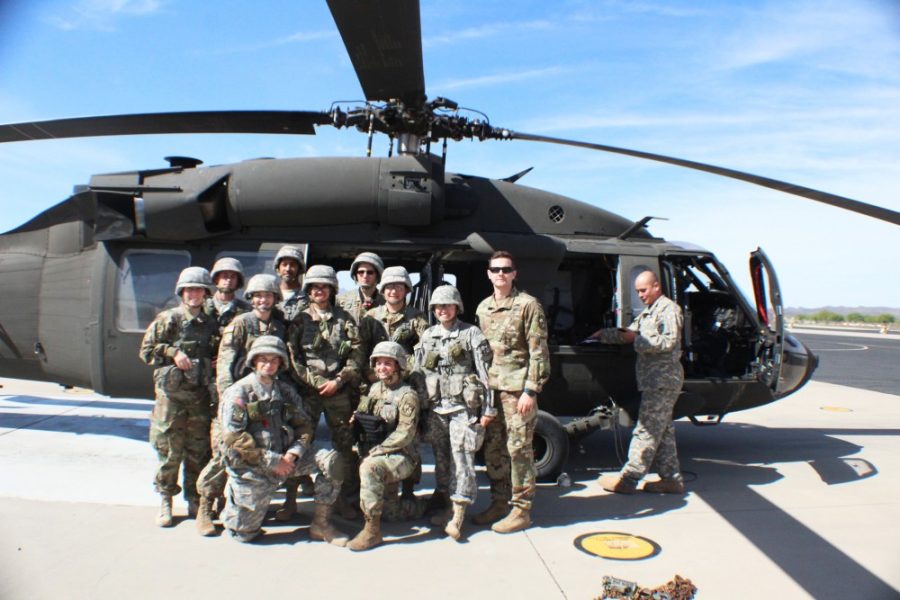The University of Arizona’s ROTC battalion laced up its boots and fired up a UH-60 Black Hawk on April 12 to complete a field training exercise in Flagstaff over
the weekend.
The Wildcat Battalion deployed to Flagstaff for three days to work on team building, leadership development and field training exercises.
“They [did] platoon tactical operations with cadets from all [the] other ROTC university programs in Arizona,” said Capt. Jeff Caraccio.
The flight and drills were far from easy for the cadets.
“In Flagstaff, they’ll be looking at our land navigation skills and really refining our skills,” said ROTC junior cadet Kendall Johnson. “We are camping this summer where we will be assessed to be admitted into the military.”
Aside from the fun the Wildcat Battalion had at 6,000 feet elevation in Flagstaff, the excitement among the cadets in anticipation of boarding the Black Hawk was palpable. The added bonus of showing up against other schools in a helicopter helped, too.
For junior cadet Abelardo Macias, it was important to arrive to the competition in style since first impressions matter, especially in the military.
“The hype is real,” Macias said. “Once we get off that helicopter, those other schools will be very jealous.”
According to Caraccio, cadets were immersed in events ranging from land navigation and obstacle and confidence courses to automatic weapons fire familiarization and a paintball competition.
Some cadets used the event as a benchmark to prepare them for a leadership program. During the summer, ROTC students are admitted into a five-week course for cadet evaluation and training.
“This course normally takes place between your junior and senior years of college and happens at Fort Knox, Kentucky,” Caraccio said.
Students in the ROTC program are offered a wide variety of opportunities for training and experience prior to being admitted into any branch of the military.
“I think this is a pretty awesome opportunity not a lot of cadets get,” Macias said. “But this is something I got through ROTC, and that’s just the fun part. What I want to do in the actual Army is be an armor officer; I want to drive some tanks.”
In Flagstaff, for one night, the cadets slept in the woods in 23-degree weather.
“We were later woken at around 3 in the morning to participate in land navigation,” Macias said. “It was quite interesting doing all this in minus-5-degree [Celsius] weather; it really makes one appreciate Tucson.”
Cadets proceeded farther into the woods at 0700 for Situational Training Exercises, which consisted of moving close to a mile through rolling hills and thick vegetation.
“We then executed our mission and moved on to the next one,” Macias said. “Saturday evening, we rucked with around 40 pounds of gear for about five miles back to the barracks for a hot shower and food. Finally, we were allowed to sleep for a full night and indoors.”
After a long weekend of rough and intense training, cadets hopped up into their rides and flew back home Sunday morning.
“I met a lot of great people on my training,” Macias said. “Of course there was that rivalry between cadets, but once we got past that, we acted as a single unit and were able to accomplish missions.”
According to the cadets, battalions leave with stronger bonds and sharper skills. Student cadets are challenged in, and out, of the classroom to later serve their country after their awaited commissioning ceremony.
“Instead of just getting a major or just being here to learn, ROTC lets you seek out those opportunities to be a leader and to be in charge of people,” Johnson said. “This really prepares you for the real world before you’re in college and before you have a job. You’re basically working toward your goals the second you start the program.”
Follow Victor Garcia on Twitter









